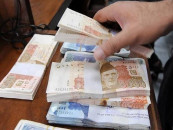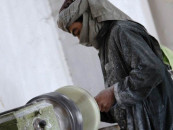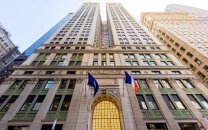Inflation, jobs continue to remain top concerns
Compared with a year ago, 12% more respondents are now worried about inflation

After three-and-a-half-year rule of Pakistan Tehreek-e-Insaf (PTI) government that came to power on the promise of creating 10 million jobs, unemployment has remained the second-biggest concern for the Pakistanis after inflation, according to a new opinion poll.
Unemployment and inflation have been the top issues of concern for the Pakistanis consistently since August 2019, according to the Ipsos survey - a market research company having presence in 90 countries. The survey took place between February 24 and March 1.
The number of people considering inflation, unemployment and poverty as the most worrying issues was on the rise.
For an overwhelming majority of respondents, inflation was the biggest concern. Compared with a year ago, 12% more respondents are now reportedly worried about inflation.
Prime Minister Imran Khan has announced a relief package to offset the impact of inflation but questions remain over its viability due to the lack of financing. The government has haphazardly put together the relief package despite the Ministry of Finance’s initial opposition to it.
Unemployment stood second in the list of top five concerns, although the ratio was slightly lower than a year ago. About half of the respondents said that they either themselves lost jobs or people known to them were laid off in the past one year.
Poverty was the third biggest concern for the Pakistanis.
The findings came at a time when the government was grappling with multiple challenges, including record high crude oil prices since 2008 and a no-confidence move by the opposition.
PM Khan had come to power on the promise of creating 10 million jobs and providing 5 million homes but no significant progress could be made to fulfill these promises.
Around 80% of the respondents believe that the country was heading in the wrong direction and the situation had worsened by 7% in the past one year, according to the opinion poll.
Only 8% of Pakistanis rated the current state of economy as strong. Those who decisively called it weak increased by 14 percentage points in the past one year.
Similarly, half of the respondents say that they see the economy remaining weak over the next six months.
People were questioned about their confidence in the economy, their opinion about the current situation compared to a year earlier, investment decisions, job prospects and the most worrying issues for them.
The coronavirus, which had crippled Pakistan’s and global economies, was no more in the list of top five concerns expressed by the Pakistani respondents, according to Ipsos. Increasing electricity prices and the burden of additional taxes were the two other issues bothering the Pakistanis.
In January, the government slapped Rs360 billion worth of additional taxes in addition to the commitment with the International Monetary Fund (IMF) to increase electricity prices by Rs2.80 per unit.
Pakistan’s economic conditions have remained fragile for the past many years and things have further deteriorated.
The survey findings also confirmed that the personal financial situation of people did not improve much.
About 8% of Pakistanis rated their personal financial situation as strong. Nearly 42% of the respondents said that their personal financial situation was weak and the remaining said it was neither strong nor weak.
For the next six months, about 55% of the respondents say they do not see any improvement in their personal finances. Less than one in five people say that they see an improvement in their personal finances in the next six months.
The survey findings revealed that consumers were not confident and were reluctant to make investment decisions besides having doubts about saving money and investing in their future.
An overwhelming majority of 86% were less confident about their job security. About 14% of survey respondents felt confident about their job security - a ratio that had remained in the range of 15% to 26% in the past.
Also, 84% of respondents felt less confident about their ability to save money and invest in their future. The remaining 16% were comfortable.
Compared to a year ago, about 87% of Pakistanis were feeling less comfortable about purchasing major items like cars and homes.
Published in The Express Tribune, March 8th, 2022.
Like Business on Facebook, follow @TribuneBiz on Twitter to stay informed and join in the conversation.



















COMMENTS
Comments are moderated and generally will be posted if they are on-topic and not abusive.
For more information, please see our Comments FAQ